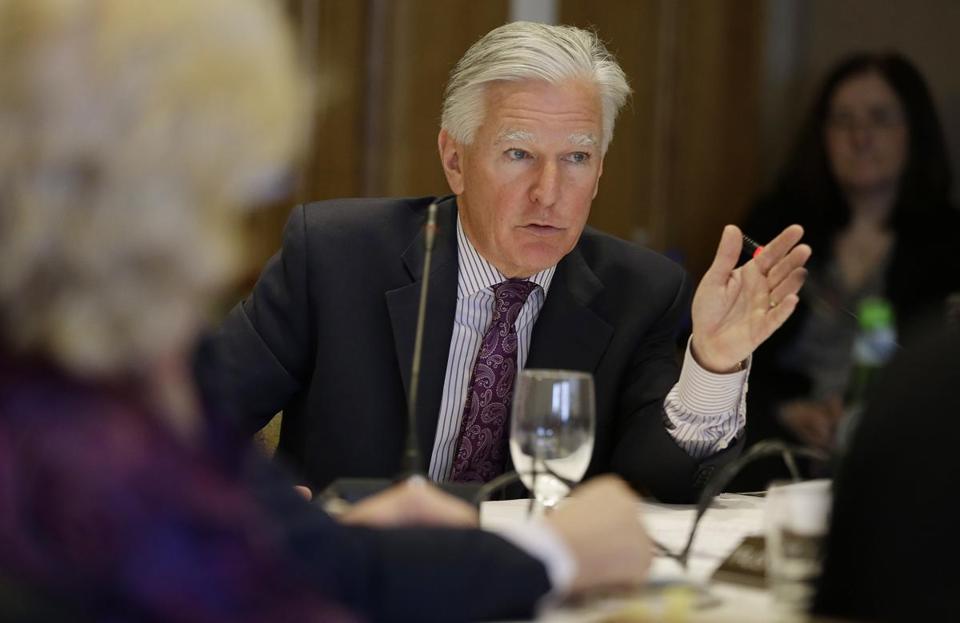
Sara Bernardo, an adjunct lecturer in economics at UMass Boston, is one of nearly 400 adjunct professors who received notices regarding possible layoffs before the Fall 2016 semester (Kirk Carapezza/WGBH)
Like many public research universities, UMass has been working hard to rebrand itself as a world-class institution. Last year, the five-campus system launched a massive - somewhat existential - marketing campaign. It's called "Here for a Reason," and features UMass students, alumni and faculty “stories of impact.”
In the opening scene of the campaign video, a woman in a lab coat says “I am here to make doctor out of kids who love science.” In another shot, a group of students smile as they discuss the adhesion power of the gecko. Faces flash by as the voice over says “we’re here, for the Commonwealth, and the common good.”
While those students and faculty certainly are here doing research for the common good, behind the slick ads, morale on UMass Boston's urban campus is pretty low these days.
That's, in part, because last month scores of adjunct faculty members were told that their jobs could be eliminated.
Sara Bernardo, an adjunct lecturer in economics at UMass Boston, was shocked when she and nearly 400 of her colleagues got notices.
"How can they justify this? This is what? One third of the faculty members? One third! What is the thought there?” said Bernardo, sitting in her office. “This is an institution both of instruction, and granting degrees and teaching students, but it's also an institution that employs people."
Cutting more teachers, many fear, may threaten the mission of the university.
“Classes will get larger,” said Arthur MacEwan, Professor Emeritus of Economics at UMass Boston.
“One of the very good things about this university is that ever since its inception 50 years ago, it has had relatively small classes,” McEwan said.
UMass Boston is facing other challenges, too.
Beneath Wheatley Hall, the parking garages on this community campus have been crumbling for decades. Today, netting hangs from the ceiling to catch falling concrete and big timbers prop up pipes and beams.
MacEwan says all this disrepair sends a negative message to faculty and students about their school.
“We’re not worth it; we’re not worth a more reasonable set of buildings,” he said, walking through the empty garages. “We’re not worth the repairs that don’t take place.”
This lack of investment is a disturbing trend, according to the American Academy of Arts and Sciences, which has found that over the past 15 years state spending per full-time student at public research universities nationwide is down 30 percent - 32 percent at UMass Boston.
Related: Amid State Funding Cuts, Public Research Universities Find Unlikely Advocate2
"All of public higher [education] is at a crossroads," said Mark Nemec, Dean of the Graham School of Continuing Liberal and Professional Studies at the University of Chicago and author of Ivory Towers and Nationalist Minds: Universities, Leadership, and the Development of the American State. "Given how important the knowledge economy is to this Commonwealth, I think it's really important for the UMass system to continue to reinforce the value that it provides to the state - not just on an individual student basis, but across the board."
UMass President Marty Meehan is trying to reinforce that message. Meehan says unless the state restores funding, layoffs and deferred maintenance at UMass Boston is just the tip of the iceberg.
“I’m always worried about the quality of the education at the University of Massachusetts - all the campuses. That’s of paramount importance to me,” said Meehan in a recent interview. “It's one of the reasons why I think it's prudent for us to see how much money the Legislature provides and not set tuition until we have those numbers."

UMass President Marty Meehan.
Meehan says that given the steep dropoff in state tax revenues, the UMass Board of Trustees will delay a decision on tuition and fees until there's more information.
As for the laid-off faculty, UMass Boston administrators say sending out notices to adjuncts was a collective bargaining requirement. Some of the faculty will be reappointed, but they won't say how many.
“This is a hell of a way to run a university,” said MacEwan.










